Analysis of Professional Identity and Practice at Travelodge Hotel
VerifiedAdded on 2020/11/12
|13
|3694
|377
Report
AI Summary
This report delves into the professional identity and practice within Travelodge Hotel, examining key aspects such as the benefits of ongoing professional development for various stakeholders and the expected skills and competencies of employees, particularly for the role of a hotel manager. It identifies essential personal skills and abilities, and explores the application of different learning theories, including behaviorism and the cognitive approach, to enhance personal and professional growth. The report also outlines a personal development plan for a hotel manager, incorporating goal setting, prioritization, and SWOT analysis. Additionally, it provides insights into the interview process for a hotel manager position, highlighting key questions, strengths, and weaknesses. Overall, the report offers a comprehensive analysis of professional development and practice within the context of Travelodge Hotel.
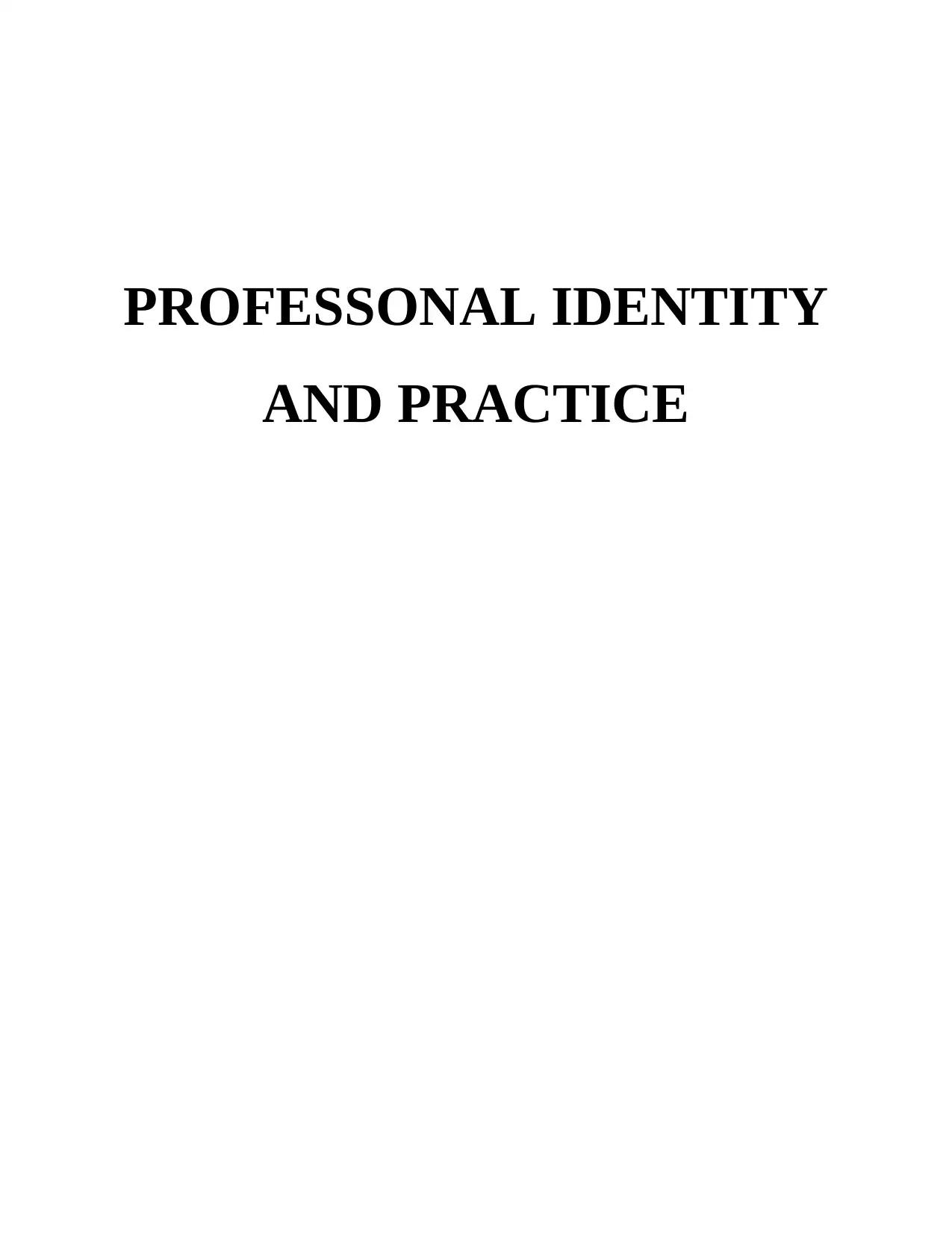
PROFESSONAL IDENTITY
AND PRACTICE
AND PRACTICE
Paraphrase This Document
Need a fresh take? Get an instant paraphrase of this document with our AI Paraphraser
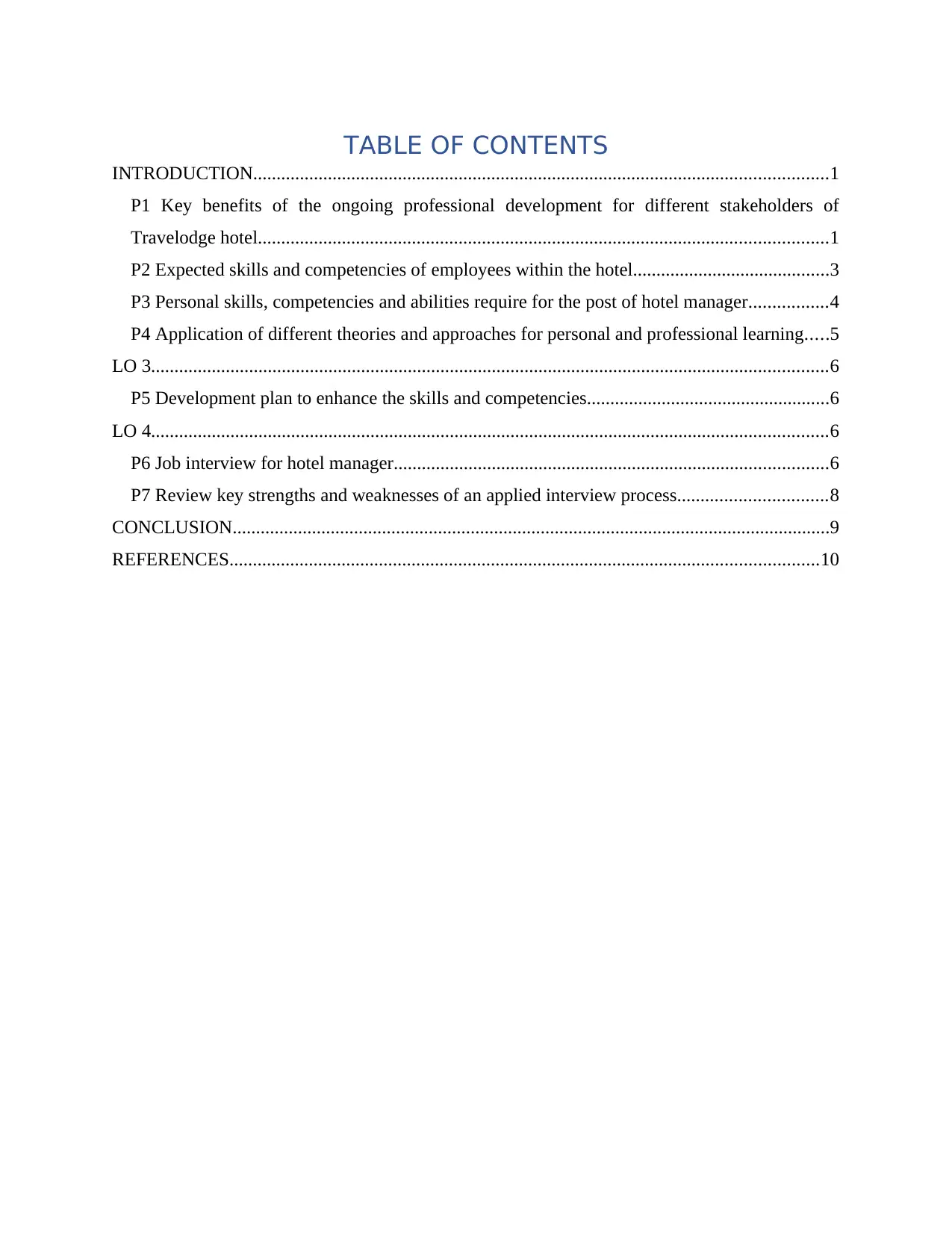
TABLE OF CONTENTS
INTRODUCTION...........................................................................................................................1
P1 Key benefits of the ongoing professional development for different stakeholders of
Travelodge hotel..........................................................................................................................1
P2 Expected skills and competencies of employees within the hotel..........................................3
P3 Personal skills, competencies and abilities require for the post of hotel manager.................4
P4 Application of different theories and approaches for personal and professional learning.....5
LO 3.................................................................................................................................................6
P5 Development plan to enhance the skills and competencies....................................................6
LO 4.................................................................................................................................................6
P6 Job interview for hotel manager.............................................................................................6
P7 Review key strengths and weaknesses of an applied interview process................................8
CONCLUSION................................................................................................................................9
REFERENCES..............................................................................................................................10
INTRODUCTION...........................................................................................................................1
P1 Key benefits of the ongoing professional development for different stakeholders of
Travelodge hotel..........................................................................................................................1
P2 Expected skills and competencies of employees within the hotel..........................................3
P3 Personal skills, competencies and abilities require for the post of hotel manager.................4
P4 Application of different theories and approaches for personal and professional learning.....5
LO 3.................................................................................................................................................6
P5 Development plan to enhance the skills and competencies....................................................6
LO 4.................................................................................................................................................6
P6 Job interview for hotel manager.............................................................................................6
P7 Review key strengths and weaknesses of an applied interview process................................8
CONCLUSION................................................................................................................................9
REFERENCES..............................................................................................................................10
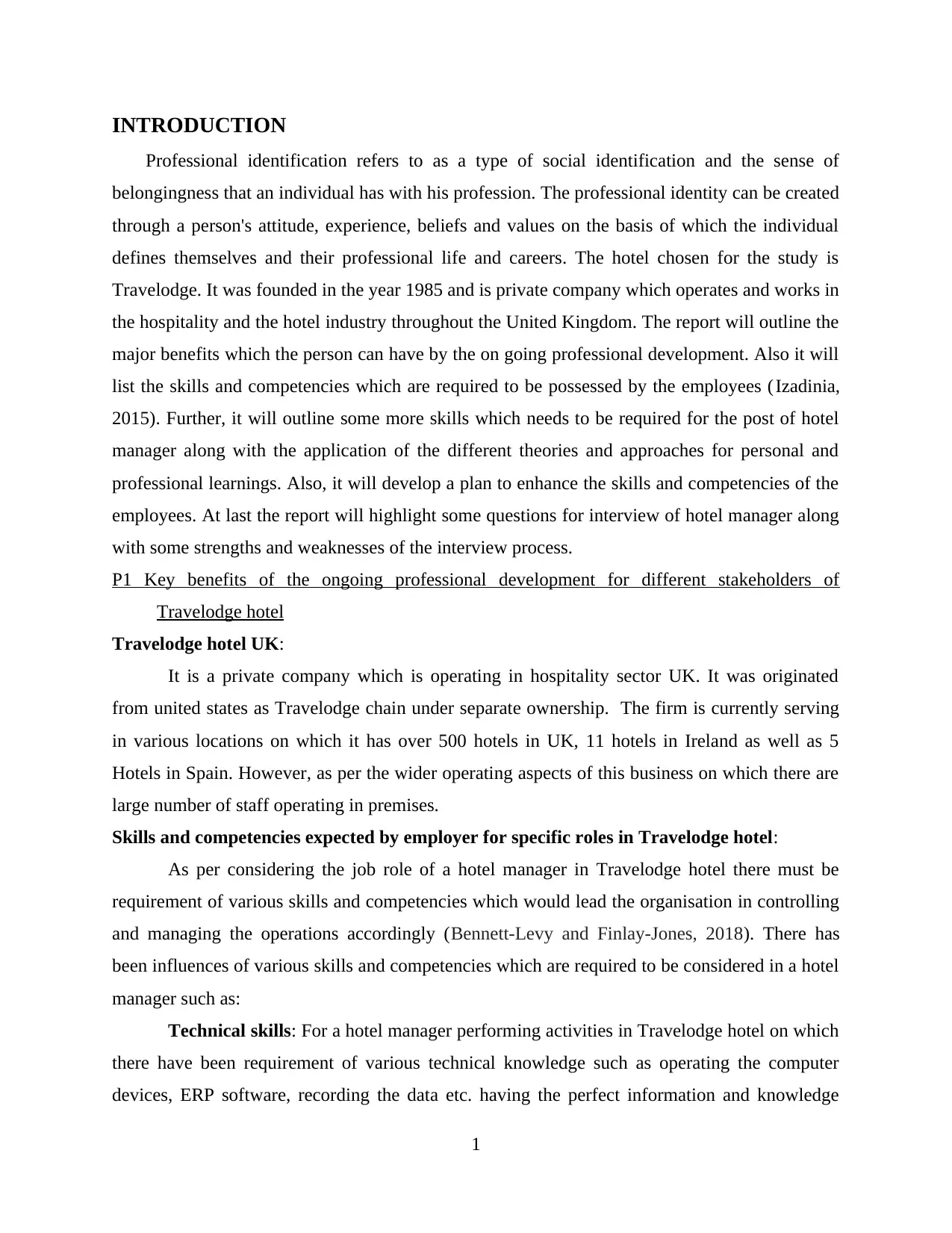
INTRODUCTION
Professional identification refers to as a type of social identification and the sense of
belongingness that an individual has with his profession. The professional identity can be created
through a person's attitude, experience, beliefs and values on the basis of which the individual
defines themselves and their professional life and careers. The hotel chosen for the study is
Travelodge. It was founded in the year 1985 and is private company which operates and works in
the hospitality and the hotel industry throughout the United Kingdom. The report will outline the
major benefits which the person can have by the on going professional development. Also it will
list the skills and competencies which are required to be possessed by the employees (Izadinia,
2015). Further, it will outline some more skills which needs to be required for the post of hotel
manager along with the application of the different theories and approaches for personal and
professional learnings. Also, it will develop a plan to enhance the skills and competencies of the
employees. At last the report will highlight some questions for interview of hotel manager along
with some strengths and weaknesses of the interview process.
P1 Key benefits of the ongoing professional development for different stakeholders of
Travelodge hotel
Travelodge hotel UK:
It is a private company which is operating in hospitality sector UK. It was originated
from united states as Travelodge chain under separate ownership. The firm is currently serving
in various locations on which it has over 500 hotels in UK, 11 hotels in Ireland as well as 5
Hotels in Spain. However, as per the wider operating aspects of this business on which there are
large number of staff operating in premises.
Skills and competencies expected by employer for specific roles in Travelodge hotel:
As per considering the job role of a hotel manager in Travelodge hotel there must be
requirement of various skills and competencies which would lead the organisation in controlling
and managing the operations accordingly (Bennett-Levy and Finlay-Jones, 2018). There has
been influences of various skills and competencies which are required to be considered in a hotel
manager such as:
Technical skills: For a hotel manager performing activities in Travelodge hotel on which
there have been requirement of various technical knowledge such as operating the computer
devices, ERP software, recording the data etc. having the perfect information and knowledge
1
Professional identification refers to as a type of social identification and the sense of
belongingness that an individual has with his profession. The professional identity can be created
through a person's attitude, experience, beliefs and values on the basis of which the individual
defines themselves and their professional life and careers. The hotel chosen for the study is
Travelodge. It was founded in the year 1985 and is private company which operates and works in
the hospitality and the hotel industry throughout the United Kingdom. The report will outline the
major benefits which the person can have by the on going professional development. Also it will
list the skills and competencies which are required to be possessed by the employees (Izadinia,
2015). Further, it will outline some more skills which needs to be required for the post of hotel
manager along with the application of the different theories and approaches for personal and
professional learnings. Also, it will develop a plan to enhance the skills and competencies of the
employees. At last the report will highlight some questions for interview of hotel manager along
with some strengths and weaknesses of the interview process.
P1 Key benefits of the ongoing professional development for different stakeholders of
Travelodge hotel
Travelodge hotel UK:
It is a private company which is operating in hospitality sector UK. It was originated
from united states as Travelodge chain under separate ownership. The firm is currently serving
in various locations on which it has over 500 hotels in UK, 11 hotels in Ireland as well as 5
Hotels in Spain. However, as per the wider operating aspects of this business on which there are
large number of staff operating in premises.
Skills and competencies expected by employer for specific roles in Travelodge hotel:
As per considering the job role of a hotel manager in Travelodge hotel there must be
requirement of various skills and competencies which would lead the organisation in controlling
and managing the operations accordingly (Bennett-Levy and Finlay-Jones, 2018). There has
been influences of various skills and competencies which are required to be considered in a hotel
manager such as:
Technical skills: For a hotel manager performing activities in Travelodge hotel on which
there have been requirement of various technical knowledge such as operating the computer
devices, ERP software, recording the data etc. having the perfect information and knowledge
1
⊘ This is a preview!⊘
Do you want full access?
Subscribe today to unlock all pages.

Trusted by 1+ million students worldwide
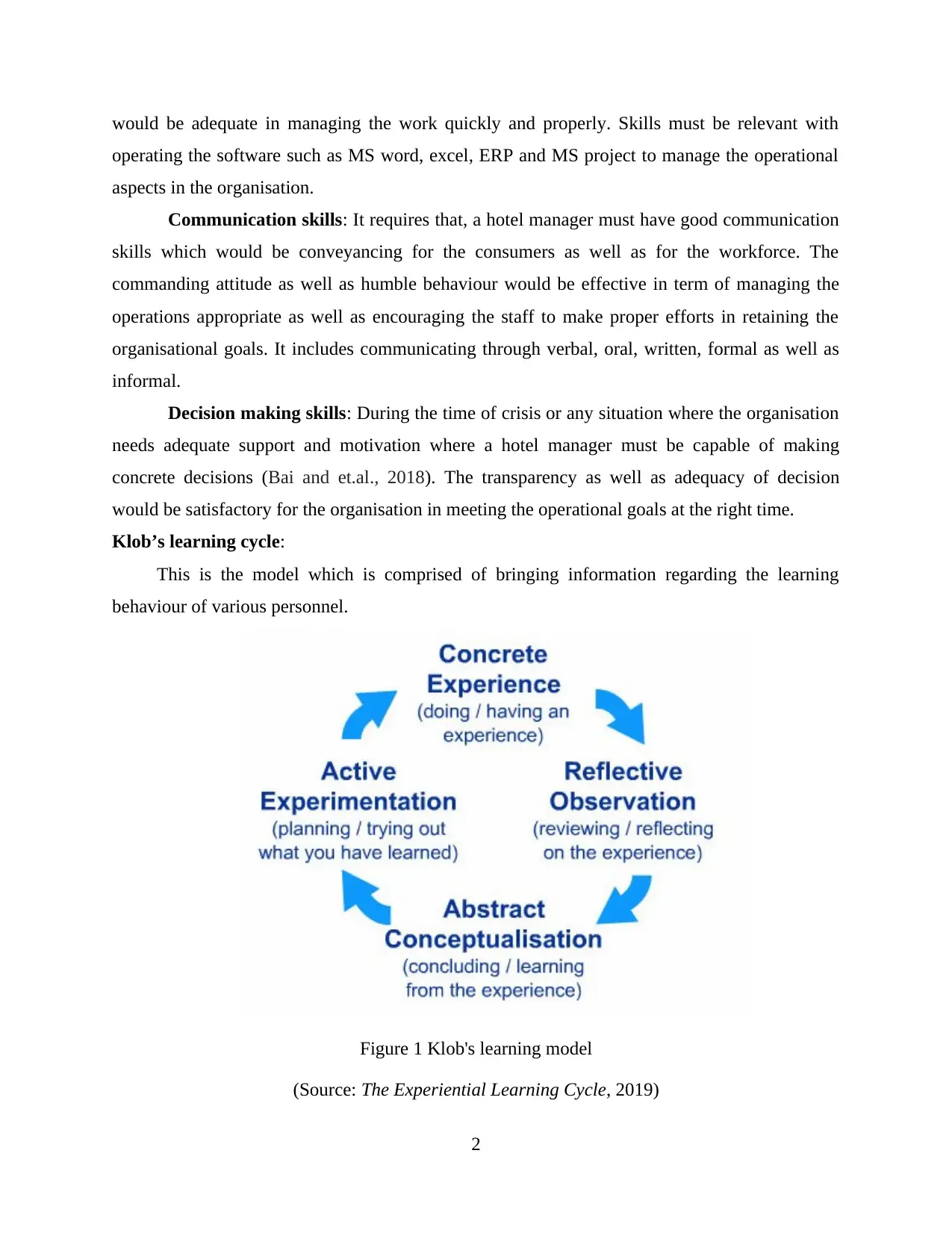
would be adequate in managing the work quickly and properly. Skills must be relevant with
operating the software such as MS word, excel, ERP and MS project to manage the operational
aspects in the organisation.
Communication skills: It requires that, a hotel manager must have good communication
skills which would be conveyancing for the consumers as well as for the workforce. The
commanding attitude as well as humble behaviour would be effective in term of managing the
operations appropriate as well as encouraging the staff to make proper efforts in retaining the
organisational goals. It includes communicating through verbal, oral, written, formal as well as
informal.
Decision making skills: During the time of crisis or any situation where the organisation
needs adequate support and motivation where a hotel manager must be capable of making
concrete decisions (Bai and et.al., 2018). The transparency as well as adequacy of decision
would be satisfactory for the organisation in meeting the operational goals at the right time.
Klob’s learning cycle:
This is the model which is comprised of bringing information regarding the learning
behaviour of various personnel.
Figure 1 Klob's learning model
(Source: The Experiential Learning Cycle, 2019)
2
operating the software such as MS word, excel, ERP and MS project to manage the operational
aspects in the organisation.
Communication skills: It requires that, a hotel manager must have good communication
skills which would be conveyancing for the consumers as well as for the workforce. The
commanding attitude as well as humble behaviour would be effective in term of managing the
operations appropriate as well as encouraging the staff to make proper efforts in retaining the
organisational goals. It includes communicating through verbal, oral, written, formal as well as
informal.
Decision making skills: During the time of crisis or any situation where the organisation
needs adequate support and motivation where a hotel manager must be capable of making
concrete decisions (Bai and et.al., 2018). The transparency as well as adequacy of decision
would be satisfactory for the organisation in meeting the operational goals at the right time.
Klob’s learning cycle:
This is the model which is comprised of bringing information regarding the learning
behaviour of various personnel.
Figure 1 Klob's learning model
(Source: The Experiential Learning Cycle, 2019)
2
Paraphrase This Document
Need a fresh take? Get an instant paraphrase of this document with our AI Paraphraser
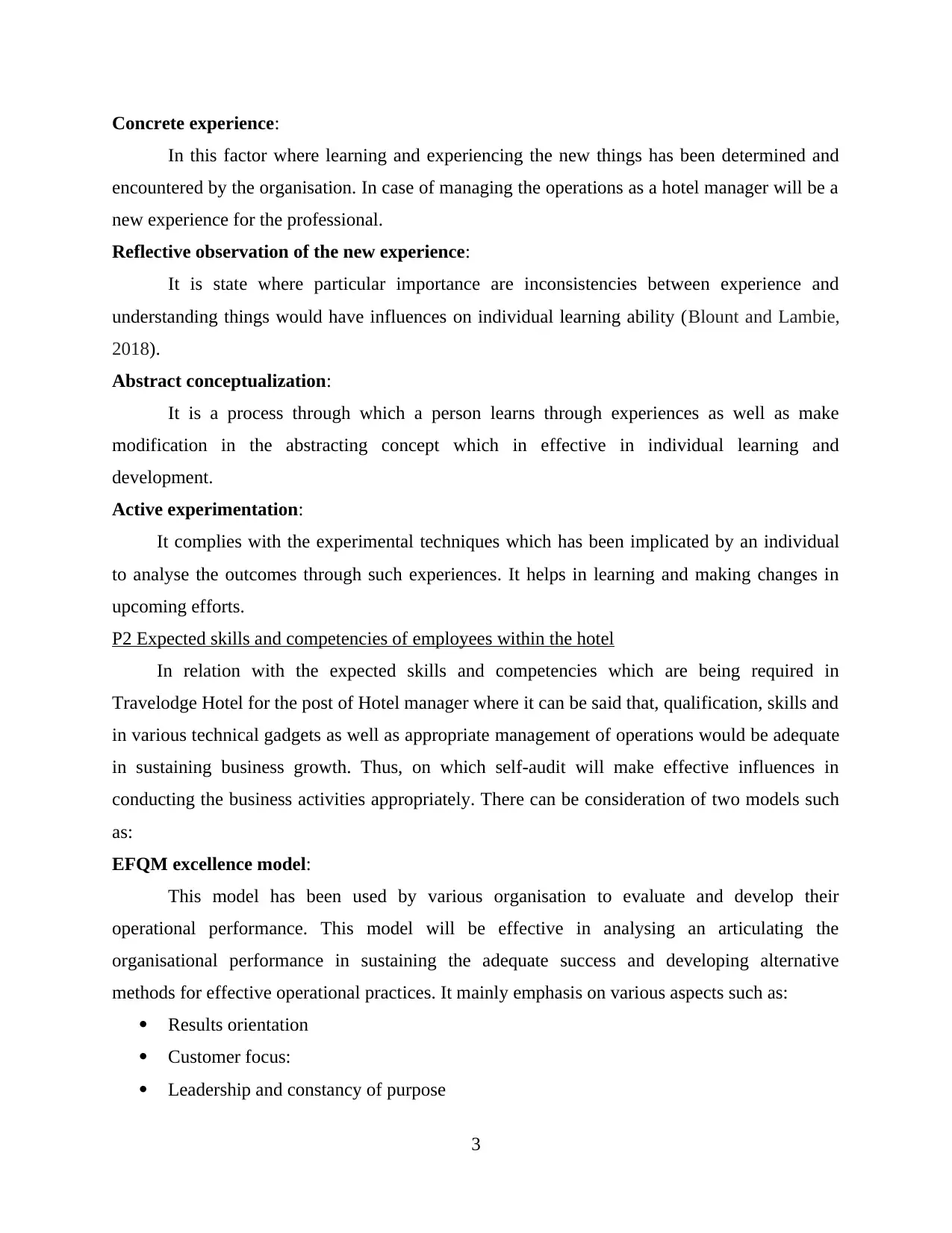
Concrete experience:
In this factor where learning and experiencing the new things has been determined and
encountered by the organisation. In case of managing the operations as a hotel manager will be a
new experience for the professional.
Reflective observation of the new experience:
It is state where particular importance are inconsistencies between experience and
understanding things would have influences on individual learning ability (Blount and Lambie,
2018).
Abstract conceptualization:
It is a process through which a person learns through experiences as well as make
modification in the abstracting concept which in effective in individual learning and
development.
Active experimentation:
It complies with the experimental techniques which has been implicated by an individual
to analyse the outcomes through such experiences. It helps in learning and making changes in
upcoming efforts.
P2 Expected skills and competencies of employees within the hotel
In relation with the expected skills and competencies which are being required in
Travelodge Hotel for the post of Hotel manager where it can be said that, qualification, skills and
in various technical gadgets as well as appropriate management of operations would be adequate
in sustaining business growth. Thus, on which self-audit will make effective influences in
conducting the business activities appropriately. There can be consideration of two models such
as:
EFQM excellence model:
This model has been used by various organisation to evaluate and develop their
operational performance. This model will be effective in analysing an articulating the
organisational performance in sustaining the adequate success and developing alternative
methods for effective operational practices. It mainly emphasis on various aspects such as:
Results orientation
Customer focus:
Leadership and constancy of purpose
3
In this factor where learning and experiencing the new things has been determined and
encountered by the organisation. In case of managing the operations as a hotel manager will be a
new experience for the professional.
Reflective observation of the new experience:
It is state where particular importance are inconsistencies between experience and
understanding things would have influences on individual learning ability (Blount and Lambie,
2018).
Abstract conceptualization:
It is a process through which a person learns through experiences as well as make
modification in the abstracting concept which in effective in individual learning and
development.
Active experimentation:
It complies with the experimental techniques which has been implicated by an individual
to analyse the outcomes through such experiences. It helps in learning and making changes in
upcoming efforts.
P2 Expected skills and competencies of employees within the hotel
In relation with the expected skills and competencies which are being required in
Travelodge Hotel for the post of Hotel manager where it can be said that, qualification, skills and
in various technical gadgets as well as appropriate management of operations would be adequate
in sustaining business growth. Thus, on which self-audit will make effective influences in
conducting the business activities appropriately. There can be consideration of two models such
as:
EFQM excellence model:
This model has been used by various organisation to evaluate and develop their
operational performance. This model will be effective in analysing an articulating the
organisational performance in sustaining the adequate success and developing alternative
methods for effective operational practices. It mainly emphasis on various aspects such as:
Results orientation
Customer focus:
Leadership and constancy of purpose
3
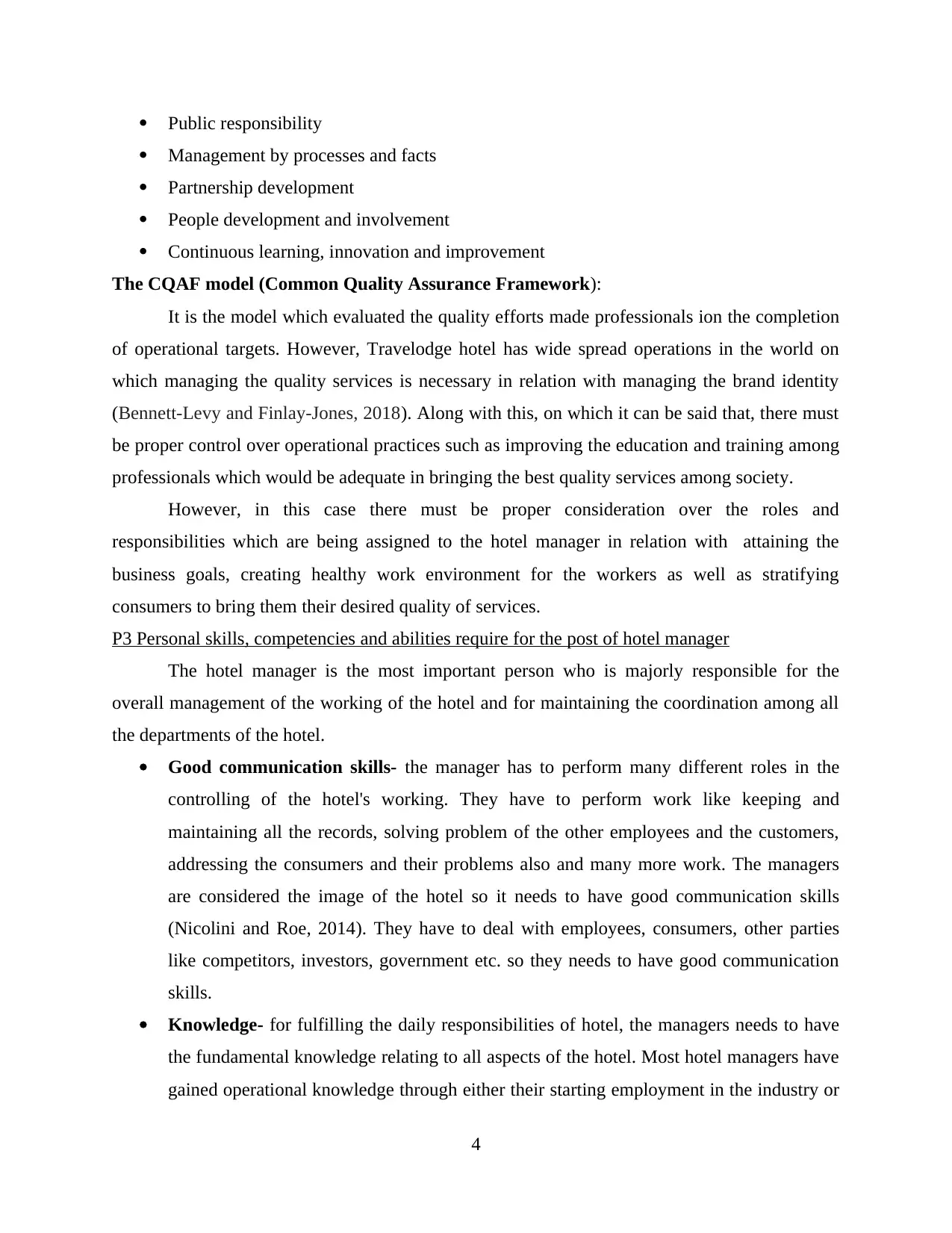
Public responsibility
Management by processes and facts
Partnership development
People development and involvement
Continuous learning, innovation and improvement
The CQAF model (Common Quality Assurance Framework):
It is the model which evaluated the quality efforts made professionals ion the completion
of operational targets. However, Travelodge hotel has wide spread operations in the world on
which managing the quality services is necessary in relation with managing the brand identity
(Bennett-Levy and Finlay-Jones, 2018). Along with this, on which it can be said that, there must
be proper control over operational practices such as improving the education and training among
professionals which would be adequate in bringing the best quality services among society.
However, in this case there must be proper consideration over the roles and
responsibilities which are being assigned to the hotel manager in relation with attaining the
business goals, creating healthy work environment for the workers as well as stratifying
consumers to bring them their desired quality of services.
P3 Personal skills, competencies and abilities require for the post of hotel manager
The hotel manager is the most important person who is majorly responsible for the
overall management of the working of the hotel and for maintaining the coordination among all
the departments of the hotel.
Good communication skills- the manager has to perform many different roles in the
controlling of the hotel's working. They have to perform work like keeping and
maintaining all the records, solving problem of the other employees and the customers,
addressing the consumers and their problems also and many more work. The managers
are considered the image of the hotel so it needs to have good communication skills
(Nicolini and Roe, 2014). They have to deal with employees, consumers, other parties
like competitors, investors, government etc. so they needs to have good communication
skills.
Knowledge- for fulfilling the daily responsibilities of hotel, the managers needs to have
the fundamental knowledge relating to all aspects of the hotel. Most hotel managers have
gained operational knowledge through either their starting employment in the industry or
4
Management by processes and facts
Partnership development
People development and involvement
Continuous learning, innovation and improvement
The CQAF model (Common Quality Assurance Framework):
It is the model which evaluated the quality efforts made professionals ion the completion
of operational targets. However, Travelodge hotel has wide spread operations in the world on
which managing the quality services is necessary in relation with managing the brand identity
(Bennett-Levy and Finlay-Jones, 2018). Along with this, on which it can be said that, there must
be proper control over operational practices such as improving the education and training among
professionals which would be adequate in bringing the best quality services among society.
However, in this case there must be proper consideration over the roles and
responsibilities which are being assigned to the hotel manager in relation with attaining the
business goals, creating healthy work environment for the workers as well as stratifying
consumers to bring them their desired quality of services.
P3 Personal skills, competencies and abilities require for the post of hotel manager
The hotel manager is the most important person who is majorly responsible for the
overall management of the working of the hotel and for maintaining the coordination among all
the departments of the hotel.
Good communication skills- the manager has to perform many different roles in the
controlling of the hotel's working. They have to perform work like keeping and
maintaining all the records, solving problem of the other employees and the customers,
addressing the consumers and their problems also and many more work. The managers
are considered the image of the hotel so it needs to have good communication skills
(Nicolini and Roe, 2014). They have to deal with employees, consumers, other parties
like competitors, investors, government etc. so they needs to have good communication
skills.
Knowledge- for fulfilling the daily responsibilities of hotel, the managers needs to have
the fundamental knowledge relating to all aspects of the hotel. Most hotel managers have
gained operational knowledge through either their starting employment in the industry or
4
⊘ This is a preview!⊘
Do you want full access?
Subscribe today to unlock all pages.

Trusted by 1+ million students worldwide
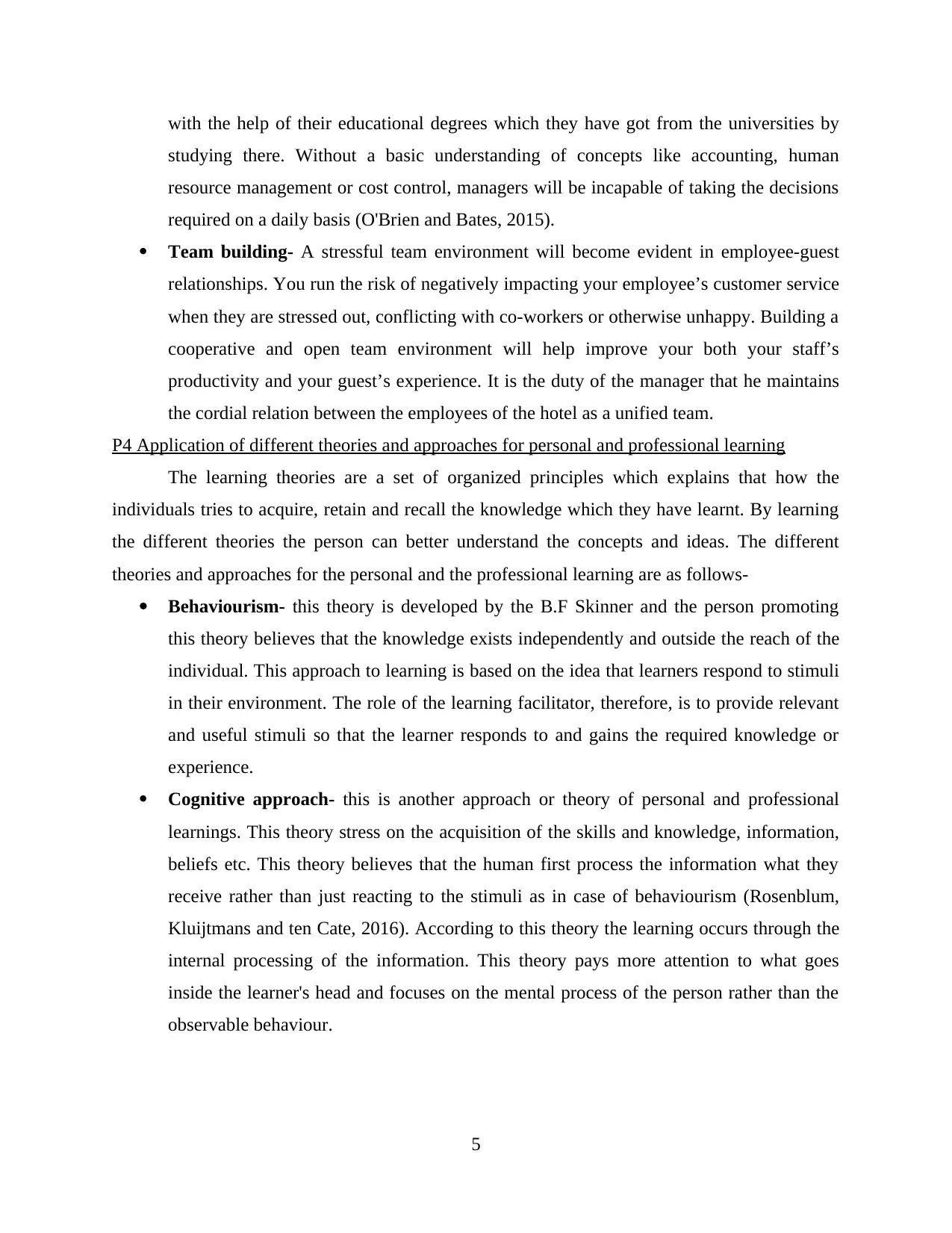
with the help of their educational degrees which they have got from the universities by
studying there. Without a basic understanding of concepts like accounting, human
resource management or cost control, managers will be incapable of taking the decisions
required on a daily basis (O'Brien and Bates, 2015).
Team building- A stressful team environment will become evident in employee-guest
relationships. You run the risk of negatively impacting your employee’s customer service
when they are stressed out, conflicting with co-workers or otherwise unhappy. Building a
cooperative and open team environment will help improve your both your staff’s
productivity and your guest’s experience. It is the duty of the manager that he maintains
the cordial relation between the employees of the hotel as a unified team.
P4 Application of different theories and approaches for personal and professional learning
The learning theories are a set of organized principles which explains that how the
individuals tries to acquire, retain and recall the knowledge which they have learnt. By learning
the different theories the person can better understand the concepts and ideas. The different
theories and approaches for the personal and the professional learning are as follows-
Behaviourism- this theory is developed by the B.F Skinner and the person promoting
this theory believes that the knowledge exists independently and outside the reach of the
individual. This approach to learning is based on the idea that learners respond to stimuli
in their environment. The role of the learning facilitator, therefore, is to provide relevant
and useful stimuli so that the learner responds to and gains the required knowledge or
experience.
Cognitive approach- this is another approach or theory of personal and professional
learnings. This theory stress on the acquisition of the skills and knowledge, information,
beliefs etc. This theory believes that the human first process the information what they
receive rather than just reacting to the stimuli as in case of behaviourism (Rosenblum,
Kluijtmans and ten Cate, 2016). According to this theory the learning occurs through the
internal processing of the information. This theory pays more attention to what goes
inside the learner's head and focuses on the mental process of the person rather than the
observable behaviour.
5
studying there. Without a basic understanding of concepts like accounting, human
resource management or cost control, managers will be incapable of taking the decisions
required on a daily basis (O'Brien and Bates, 2015).
Team building- A stressful team environment will become evident in employee-guest
relationships. You run the risk of negatively impacting your employee’s customer service
when they are stressed out, conflicting with co-workers or otherwise unhappy. Building a
cooperative and open team environment will help improve your both your staff’s
productivity and your guest’s experience. It is the duty of the manager that he maintains
the cordial relation between the employees of the hotel as a unified team.
P4 Application of different theories and approaches for personal and professional learning
The learning theories are a set of organized principles which explains that how the
individuals tries to acquire, retain and recall the knowledge which they have learnt. By learning
the different theories the person can better understand the concepts and ideas. The different
theories and approaches for the personal and the professional learning are as follows-
Behaviourism- this theory is developed by the B.F Skinner and the person promoting
this theory believes that the knowledge exists independently and outside the reach of the
individual. This approach to learning is based on the idea that learners respond to stimuli
in their environment. The role of the learning facilitator, therefore, is to provide relevant
and useful stimuli so that the learner responds to and gains the required knowledge or
experience.
Cognitive approach- this is another approach or theory of personal and professional
learnings. This theory stress on the acquisition of the skills and knowledge, information,
beliefs etc. This theory believes that the human first process the information what they
receive rather than just reacting to the stimuli as in case of behaviourism (Rosenblum,
Kluijtmans and ten Cate, 2016). According to this theory the learning occurs through the
internal processing of the information. This theory pays more attention to what goes
inside the learner's head and focuses on the mental process of the person rather than the
observable behaviour.
5
Paraphrase This Document
Need a fresh take? Get an instant paraphrase of this document with our AI Paraphraser
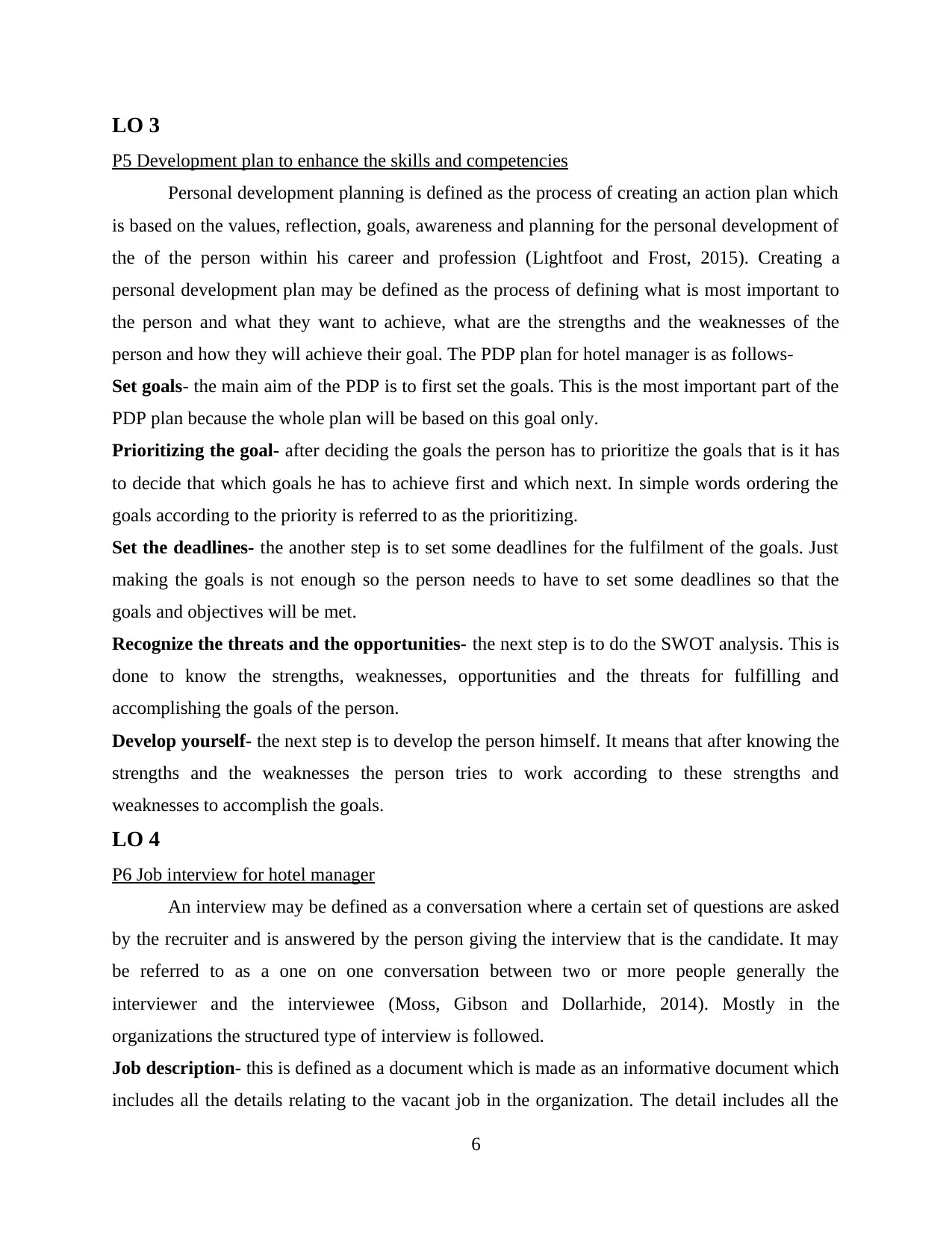
LO 3
P5 Development plan to enhance the skills and competencies
Personal development planning is defined as the process of creating an action plan which
is based on the values, reflection, goals, awareness and planning for the personal development of
the of the person within his career and profession (Lightfoot and Frost, 2015). Creating a
personal development plan may be defined as the process of defining what is most important to
the person and what they want to achieve, what are the strengths and the weaknesses of the
person and how they will achieve their goal. The PDP plan for hotel manager is as follows-
Set goals- the main aim of the PDP is to first set the goals. This is the most important part of the
PDP plan because the whole plan will be based on this goal only.
Prioritizing the goal- after deciding the goals the person has to prioritize the goals that is it has
to decide that which goals he has to achieve first and which next. In simple words ordering the
goals according to the priority is referred to as the prioritizing.
Set the deadlines- the another step is to set some deadlines for the fulfilment of the goals. Just
making the goals is not enough so the person needs to have to set some deadlines so that the
goals and objectives will be met.
Recognize the threats and the opportunities- the next step is to do the SWOT analysis. This is
done to know the strengths, weaknesses, opportunities and the threats for fulfilling and
accomplishing the goals of the person.
Develop yourself- the next step is to develop the person himself. It means that after knowing the
strengths and the weaknesses the person tries to work according to these strengths and
weaknesses to accomplish the goals.
LO 4
P6 Job interview for hotel manager
An interview may be defined as a conversation where a certain set of questions are asked
by the recruiter and is answered by the person giving the interview that is the candidate. It may
be referred to as a one on one conversation between two or more people generally the
interviewer and the interviewee (Moss, Gibson and Dollarhide, 2014). Mostly in the
organizations the structured type of interview is followed.
Job description- this is defined as a document which is made as an informative document which
includes all the details relating to the vacant job in the organization. The detail includes all the
6
P5 Development plan to enhance the skills and competencies
Personal development planning is defined as the process of creating an action plan which
is based on the values, reflection, goals, awareness and planning for the personal development of
the of the person within his career and profession (Lightfoot and Frost, 2015). Creating a
personal development plan may be defined as the process of defining what is most important to
the person and what they want to achieve, what are the strengths and the weaknesses of the
person and how they will achieve their goal. The PDP plan for hotel manager is as follows-
Set goals- the main aim of the PDP is to first set the goals. This is the most important part of the
PDP plan because the whole plan will be based on this goal only.
Prioritizing the goal- after deciding the goals the person has to prioritize the goals that is it has
to decide that which goals he has to achieve first and which next. In simple words ordering the
goals according to the priority is referred to as the prioritizing.
Set the deadlines- the another step is to set some deadlines for the fulfilment of the goals. Just
making the goals is not enough so the person needs to have to set some deadlines so that the
goals and objectives will be met.
Recognize the threats and the opportunities- the next step is to do the SWOT analysis. This is
done to know the strengths, weaknesses, opportunities and the threats for fulfilling and
accomplishing the goals of the person.
Develop yourself- the next step is to develop the person himself. It means that after knowing the
strengths and the weaknesses the person tries to work according to these strengths and
weaknesses to accomplish the goals.
LO 4
P6 Job interview for hotel manager
An interview may be defined as a conversation where a certain set of questions are asked
by the recruiter and is answered by the person giving the interview that is the candidate. It may
be referred to as a one on one conversation between two or more people generally the
interviewer and the interviewee (Moss, Gibson and Dollarhide, 2014). Mostly in the
organizations the structured type of interview is followed.
Job description- this is defined as a document which is made as an informative document which
includes all the details relating to the vacant job in the organization. The detail includes all the
6
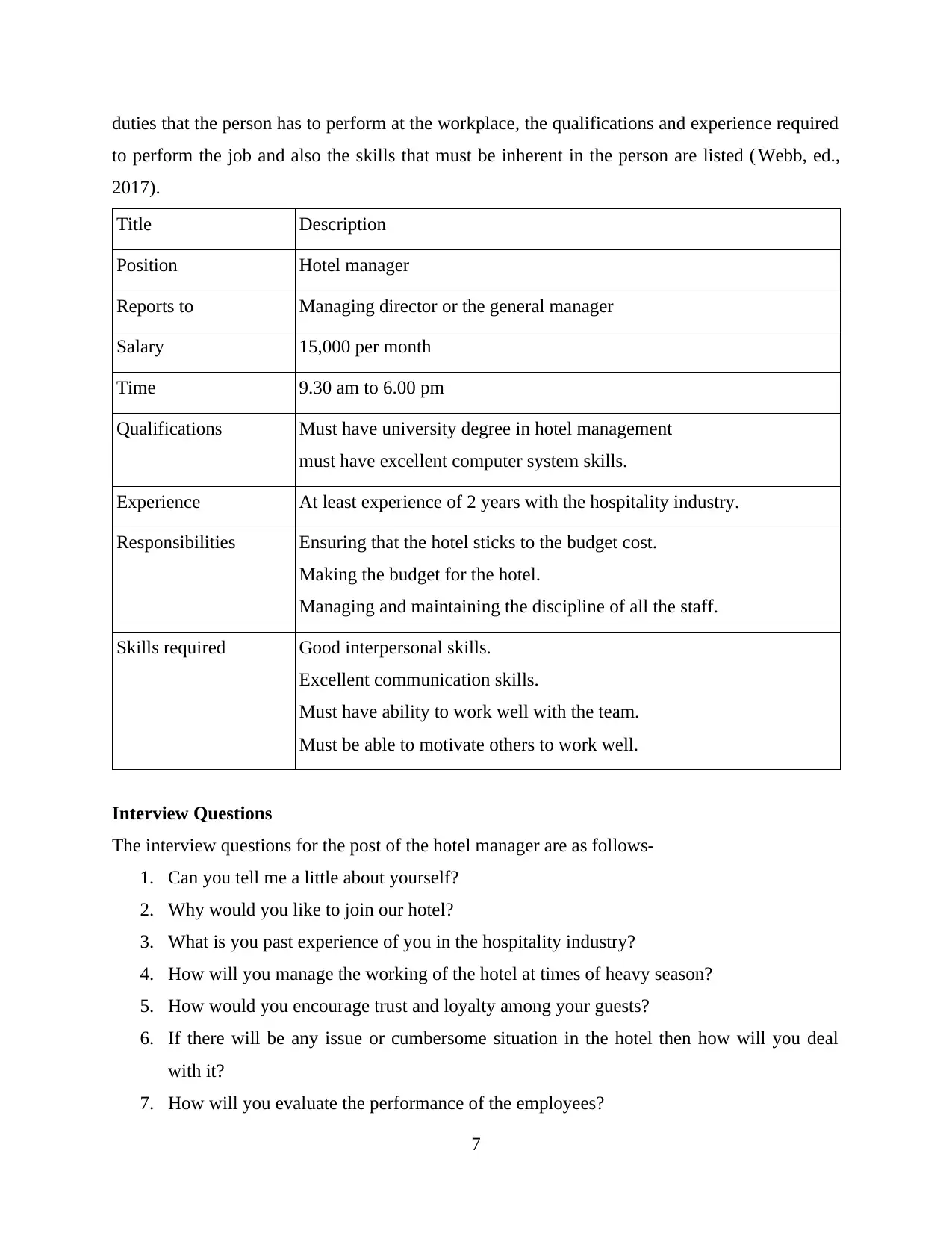
duties that the person has to perform at the workplace, the qualifications and experience required
to perform the job and also the skills that must be inherent in the person are listed ( Webb, ed.,
2017).
Title Description
Position Hotel manager
Reports to Managing director or the general manager
Salary 15,000 per month
Time 9.30 am to 6.00 pm
Qualifications Must have university degree in hotel management
must have excellent computer system skills.
Experience At least experience of 2 years with the hospitality industry.
Responsibilities Ensuring that the hotel sticks to the budget cost.
Making the budget for the hotel.
Managing and maintaining the discipline of all the staff.
Skills required Good interpersonal skills.
Excellent communication skills.
Must have ability to work well with the team.
Must be able to motivate others to work well.
Interview Questions
The interview questions for the post of the hotel manager are as follows-
1. Can you tell me a little about yourself?
2. Why would you like to join our hotel?
3. What is you past experience of you in the hospitality industry?
4. How will you manage the working of the hotel at times of heavy season?
5. How would you encourage trust and loyalty among your guests?
6. If there will be any issue or cumbersome situation in the hotel then how will you deal
with it?
7. How will you evaluate the performance of the employees?
7
to perform the job and also the skills that must be inherent in the person are listed ( Webb, ed.,
2017).
Title Description
Position Hotel manager
Reports to Managing director or the general manager
Salary 15,000 per month
Time 9.30 am to 6.00 pm
Qualifications Must have university degree in hotel management
must have excellent computer system skills.
Experience At least experience of 2 years with the hospitality industry.
Responsibilities Ensuring that the hotel sticks to the budget cost.
Making the budget for the hotel.
Managing and maintaining the discipline of all the staff.
Skills required Good interpersonal skills.
Excellent communication skills.
Must have ability to work well with the team.
Must be able to motivate others to work well.
Interview Questions
The interview questions for the post of the hotel manager are as follows-
1. Can you tell me a little about yourself?
2. Why would you like to join our hotel?
3. What is you past experience of you in the hospitality industry?
4. How will you manage the working of the hotel at times of heavy season?
5. How would you encourage trust and loyalty among your guests?
6. If there will be any issue or cumbersome situation in the hotel then how will you deal
with it?
7. How will you evaluate the performance of the employees?
7
⊘ This is a preview!⊘
Do you want full access?
Subscribe today to unlock all pages.

Trusted by 1+ million students worldwide
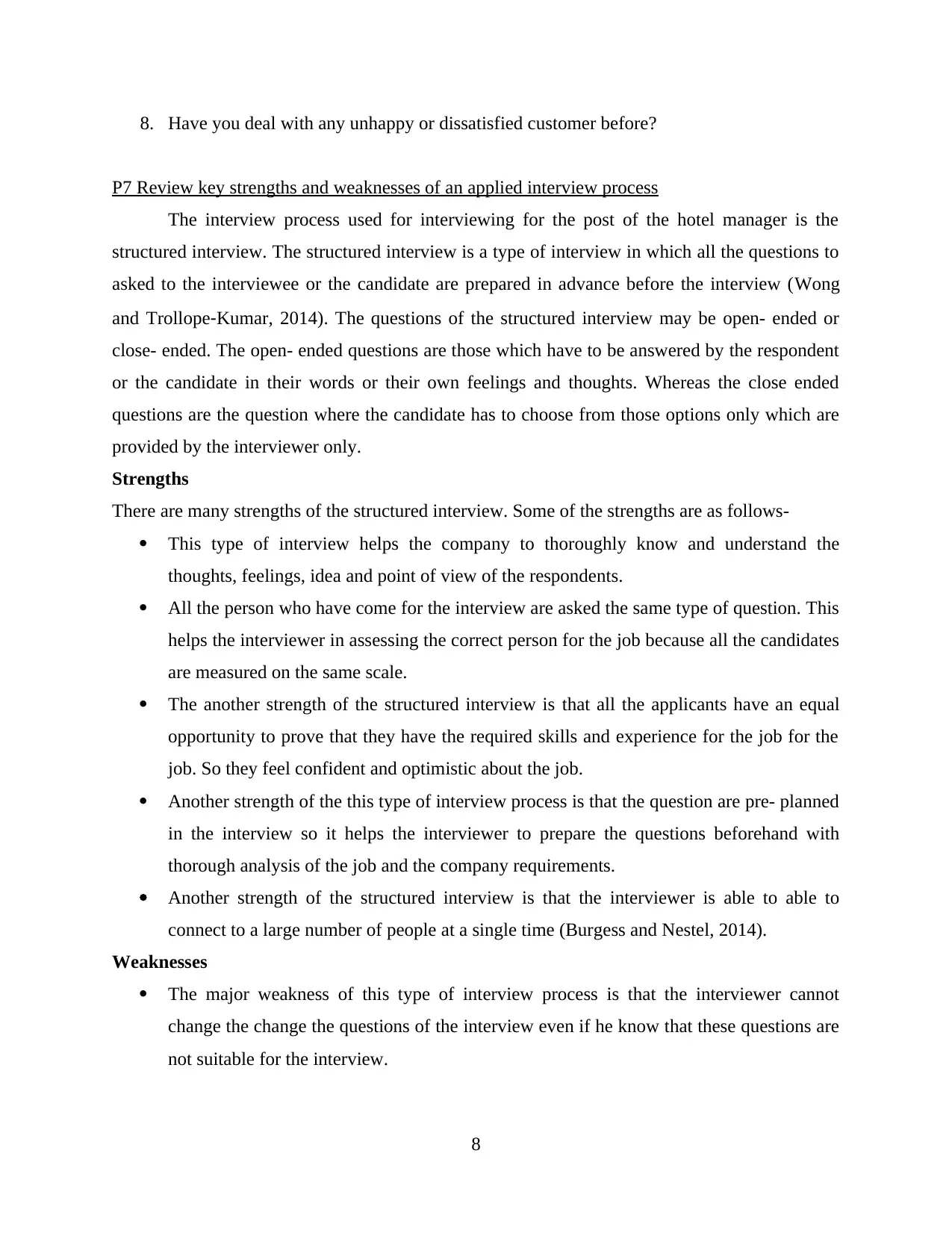
8. Have you deal with any unhappy or dissatisfied customer before?
P7 Review key strengths and weaknesses of an applied interview process
The interview process used for interviewing for the post of the hotel manager is the
structured interview. The structured interview is a type of interview in which all the questions to
asked to the interviewee or the candidate are prepared in advance before the interview (Wong
and Trollope‐Kumar, 2014). The questions of the structured interview may be open- ended or
close- ended. The open- ended questions are those which have to be answered by the respondent
or the candidate in their words or their own feelings and thoughts. Whereas the close ended
questions are the question where the candidate has to choose from those options only which are
provided by the interviewer only.
Strengths
There are many strengths of the structured interview. Some of the strengths are as follows-
This type of interview helps the company to thoroughly know and understand the
thoughts, feelings, idea and point of view of the respondents.
All the person who have come for the interview are asked the same type of question. This
helps the interviewer in assessing the correct person for the job because all the candidates
are measured on the same scale.
The another strength of the structured interview is that all the applicants have an equal
opportunity to prove that they have the required skills and experience for the job for the
job. So they feel confident and optimistic about the job.
Another strength of the this type of interview process is that the question are pre- planned
in the interview so it helps the interviewer to prepare the questions beforehand with
thorough analysis of the job and the company requirements.
Another strength of the structured interview is that the interviewer is able to able to
connect to a large number of people at a single time (Burgess and Nestel, 2014).
Weaknesses
The major weakness of this type of interview process is that the interviewer cannot
change the change the questions of the interview even if he know that these questions are
not suitable for the interview.
8
P7 Review key strengths and weaknesses of an applied interview process
The interview process used for interviewing for the post of the hotel manager is the
structured interview. The structured interview is a type of interview in which all the questions to
asked to the interviewee or the candidate are prepared in advance before the interview (Wong
and Trollope‐Kumar, 2014). The questions of the structured interview may be open- ended or
close- ended. The open- ended questions are those which have to be answered by the respondent
or the candidate in their words or their own feelings and thoughts. Whereas the close ended
questions are the question where the candidate has to choose from those options only which are
provided by the interviewer only.
Strengths
There are many strengths of the structured interview. Some of the strengths are as follows-
This type of interview helps the company to thoroughly know and understand the
thoughts, feelings, idea and point of view of the respondents.
All the person who have come for the interview are asked the same type of question. This
helps the interviewer in assessing the correct person for the job because all the candidates
are measured on the same scale.
The another strength of the structured interview is that all the applicants have an equal
opportunity to prove that they have the required skills and experience for the job for the
job. So they feel confident and optimistic about the job.
Another strength of the this type of interview process is that the question are pre- planned
in the interview so it helps the interviewer to prepare the questions beforehand with
thorough analysis of the job and the company requirements.
Another strength of the structured interview is that the interviewer is able to able to
connect to a large number of people at a single time (Burgess and Nestel, 2014).
Weaknesses
The major weakness of this type of interview process is that the interviewer cannot
change the change the questions of the interview even if he know that these questions are
not suitable for the interview.
8
Paraphrase This Document
Need a fresh take? Get an instant paraphrase of this document with our AI Paraphraser
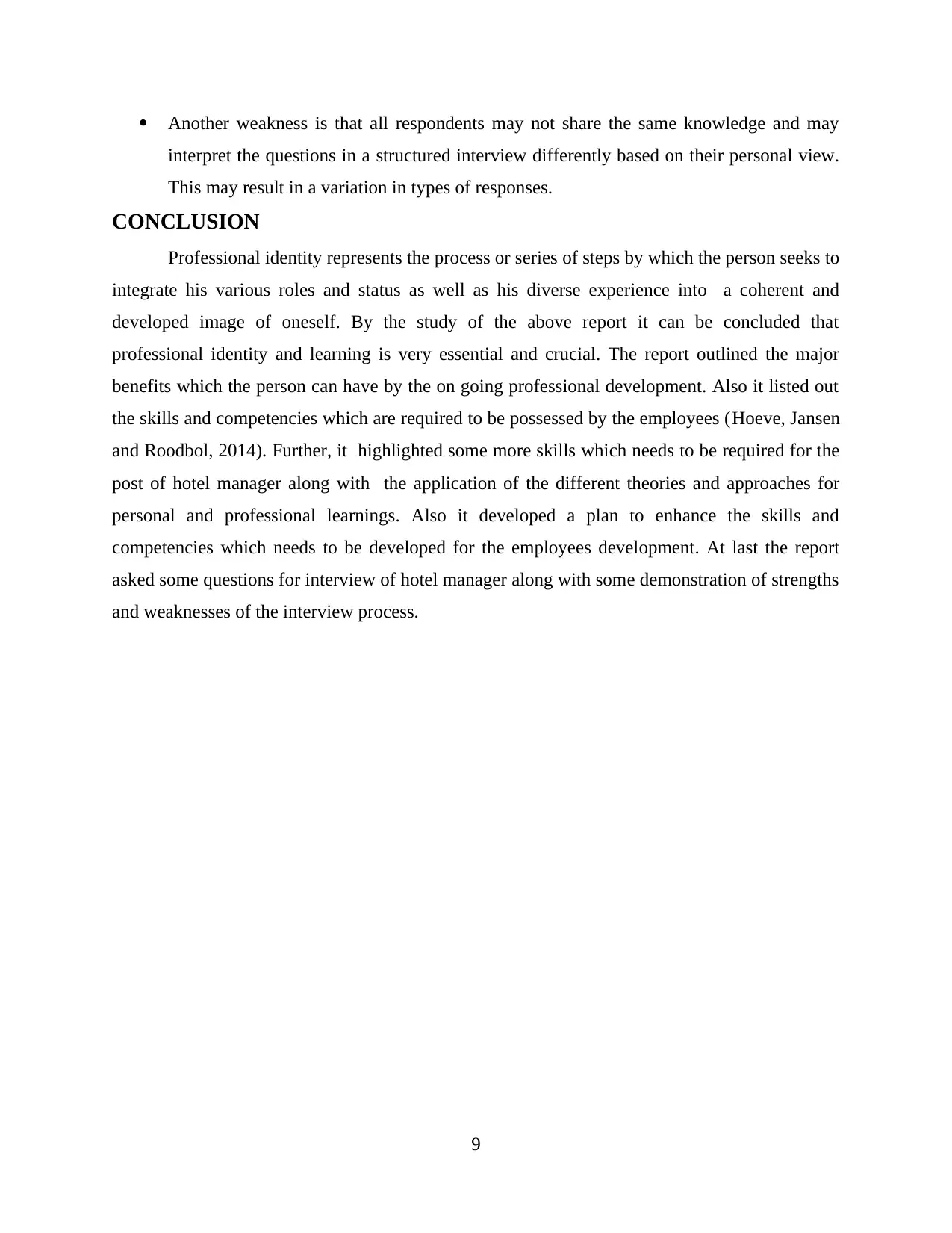
Another weakness is that all respondents may not share the same knowledge and may
interpret the questions in a structured interview differently based on their personal view.
This may result in a variation in types of responses.
CONCLUSION
Professional identity represents the process or series of steps by which the person seeks to
integrate his various roles and status as well as his diverse experience into a coherent and
developed image of oneself. By the study of the above report it can be concluded that
professional identity and learning is very essential and crucial. The report outlined the major
benefits which the person can have by the on going professional development. Also it listed out
the skills and competencies which are required to be possessed by the employees (Hoeve, Jansen
and Roodbol, 2014). Further, it highlighted some more skills which needs to be required for the
post of hotel manager along with the application of the different theories and approaches for
personal and professional learnings. Also it developed a plan to enhance the skills and
competencies which needs to be developed for the employees development. At last the report
asked some questions for interview of hotel manager along with some demonstration of strengths
and weaknesses of the interview process.
9
interpret the questions in a structured interview differently based on their personal view.
This may result in a variation in types of responses.
CONCLUSION
Professional identity represents the process or series of steps by which the person seeks to
integrate his various roles and status as well as his diverse experience into a coherent and
developed image of oneself. By the study of the above report it can be concluded that
professional identity and learning is very essential and crucial. The report outlined the major
benefits which the person can have by the on going professional development. Also it listed out
the skills and competencies which are required to be possessed by the employees (Hoeve, Jansen
and Roodbol, 2014). Further, it highlighted some more skills which needs to be required for the
post of hotel manager along with the application of the different theories and approaches for
personal and professional learnings. Also it developed a plan to enhance the skills and
competencies which needs to be developed for the employees development. At last the report
asked some questions for interview of hotel manager along with some demonstration of strengths
and weaknesses of the interview process.
9
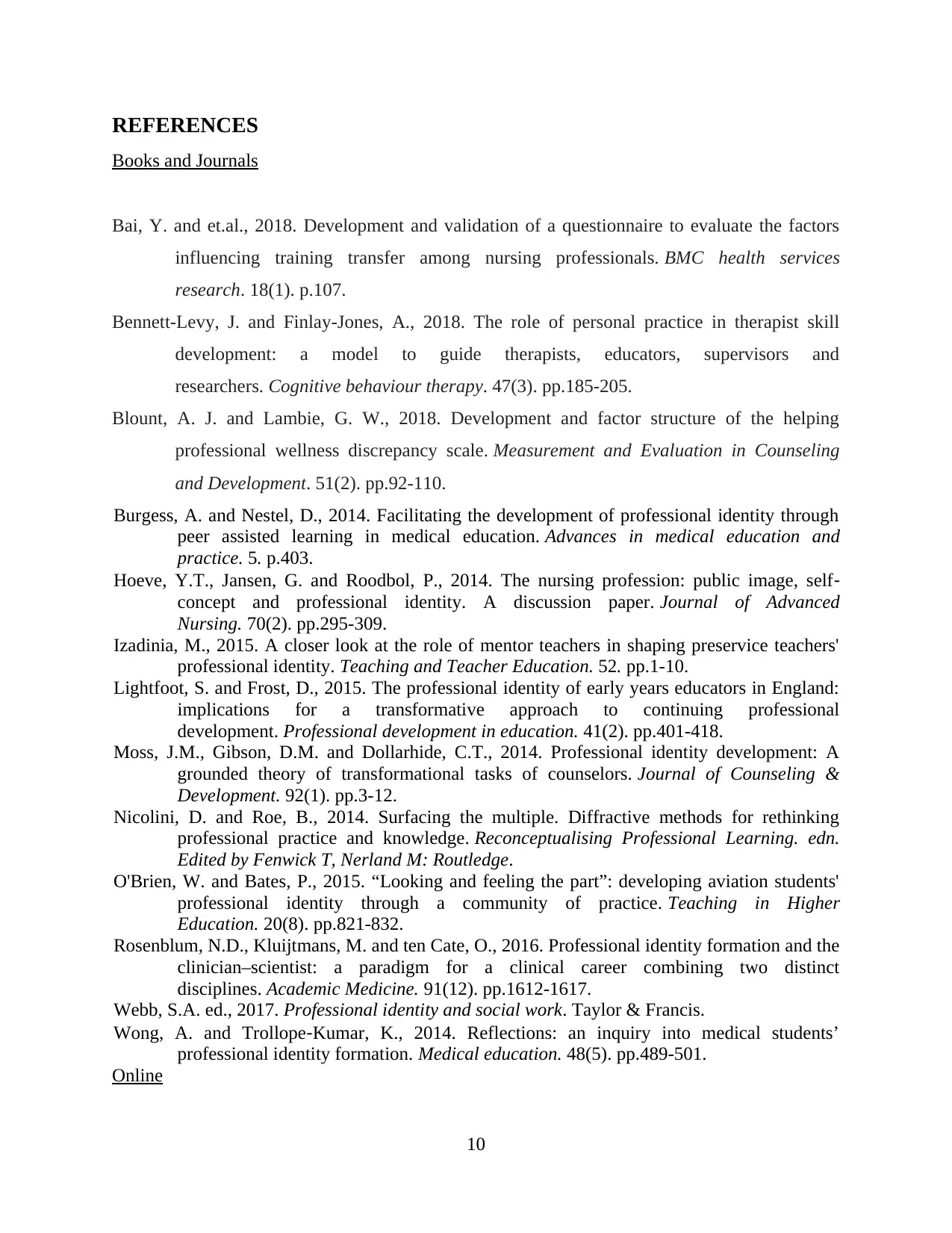
REFERENCES
Books and Journals
Bai, Y. and et.al., 2018. Development and validation of a questionnaire to evaluate the factors
influencing training transfer among nursing professionals. BMC health services
research. 18(1). p.107.
Bennett-Levy, J. and Finlay-Jones, A., 2018. The role of personal practice in therapist skill
development: a model to guide therapists, educators, supervisors and
researchers. Cognitive behaviour therapy. 47(3). pp.185-205.
Blount, A. J. and Lambie, G. W., 2018. Development and factor structure of the helping
professional wellness discrepancy scale. Measurement and Evaluation in Counseling
and Development. 51(2). pp.92-110.
Burgess, A. and Nestel, D., 2014. Facilitating the development of professional identity through
peer assisted learning in medical education. Advances in medical education and
practice. 5. p.403.
Hoeve, Y.T., Jansen, G. and Roodbol, P., 2014. The nursing profession: public image, self‐
concept and professional identity. A discussion paper. Journal of Advanced
Nursing. 70(2). pp.295-309.
Izadinia, M., 2015. A closer look at the role of mentor teachers in shaping preservice teachers'
professional identity. Teaching and Teacher Education. 52. pp.1-10.
Lightfoot, S. and Frost, D., 2015. The professional identity of early years educators in England:
implications for a transformative approach to continuing professional
development. Professional development in education. 41(2). pp.401-418.
Moss, J.M., Gibson, D.M. and Dollarhide, C.T., 2014. Professional identity development: A
grounded theory of transformational tasks of counselors. Journal of Counseling &
Development. 92(1). pp.3-12.
Nicolini, D. and Roe, B., 2014. Surfacing the multiple. Diffractive methods for rethinking
professional practice and knowledge. Reconceptualising Professional Learning. edn.
Edited by Fenwick T, Nerland M: Routledge.
O'Brien, W. and Bates, P., 2015. “Looking and feeling the part”: developing aviation students'
professional identity through a community of practice. Teaching in Higher
Education. 20(8). pp.821-832.
Rosenblum, N.D., Kluijtmans, M. and ten Cate, O., 2016. Professional identity formation and the
clinician–scientist: a paradigm for a clinical career combining two distinct
disciplines. Academic Medicine. 91(12). pp.1612-1617.
Webb, S.A. ed., 2017. Professional identity and social work. Taylor & Francis.
Wong, A. and Trollope‐Kumar, K., 2014. Reflections: an inquiry into medical students’
professional identity formation. Medical education. 48(5). pp.489-501.
Online
10
Books and Journals
Bai, Y. and et.al., 2018. Development and validation of a questionnaire to evaluate the factors
influencing training transfer among nursing professionals. BMC health services
research. 18(1). p.107.
Bennett-Levy, J. and Finlay-Jones, A., 2018. The role of personal practice in therapist skill
development: a model to guide therapists, educators, supervisors and
researchers. Cognitive behaviour therapy. 47(3). pp.185-205.
Blount, A. J. and Lambie, G. W., 2018. Development and factor structure of the helping
professional wellness discrepancy scale. Measurement and Evaluation in Counseling
and Development. 51(2). pp.92-110.
Burgess, A. and Nestel, D., 2014. Facilitating the development of professional identity through
peer assisted learning in medical education. Advances in medical education and
practice. 5. p.403.
Hoeve, Y.T., Jansen, G. and Roodbol, P., 2014. The nursing profession: public image, self‐
concept and professional identity. A discussion paper. Journal of Advanced
Nursing. 70(2). pp.295-309.
Izadinia, M., 2015. A closer look at the role of mentor teachers in shaping preservice teachers'
professional identity. Teaching and Teacher Education. 52. pp.1-10.
Lightfoot, S. and Frost, D., 2015. The professional identity of early years educators in England:
implications for a transformative approach to continuing professional
development. Professional development in education. 41(2). pp.401-418.
Moss, J.M., Gibson, D.M. and Dollarhide, C.T., 2014. Professional identity development: A
grounded theory of transformational tasks of counselors. Journal of Counseling &
Development. 92(1). pp.3-12.
Nicolini, D. and Roe, B., 2014. Surfacing the multiple. Diffractive methods for rethinking
professional practice and knowledge. Reconceptualising Professional Learning. edn.
Edited by Fenwick T, Nerland M: Routledge.
O'Brien, W. and Bates, P., 2015. “Looking and feeling the part”: developing aviation students'
professional identity through a community of practice. Teaching in Higher
Education. 20(8). pp.821-832.
Rosenblum, N.D., Kluijtmans, M. and ten Cate, O., 2016. Professional identity formation and the
clinician–scientist: a paradigm for a clinical career combining two distinct
disciplines. Academic Medicine. 91(12). pp.1612-1617.
Webb, S.A. ed., 2017. Professional identity and social work. Taylor & Francis.
Wong, A. and Trollope‐Kumar, K., 2014. Reflections: an inquiry into medical students’
professional identity formation. Medical education. 48(5). pp.489-501.
Online
10
⊘ This is a preview!⊘
Do you want full access?
Subscribe today to unlock all pages.

Trusted by 1+ million students worldwide
1 out of 13
Related Documents
Your All-in-One AI-Powered Toolkit for Academic Success.
+13062052269
info@desklib.com
Available 24*7 on WhatsApp / Email
![[object Object]](/_next/static/media/star-bottom.7253800d.svg)
Unlock your academic potential
Copyright © 2020–2025 A2Z Services. All Rights Reserved. Developed and managed by ZUCOL.





